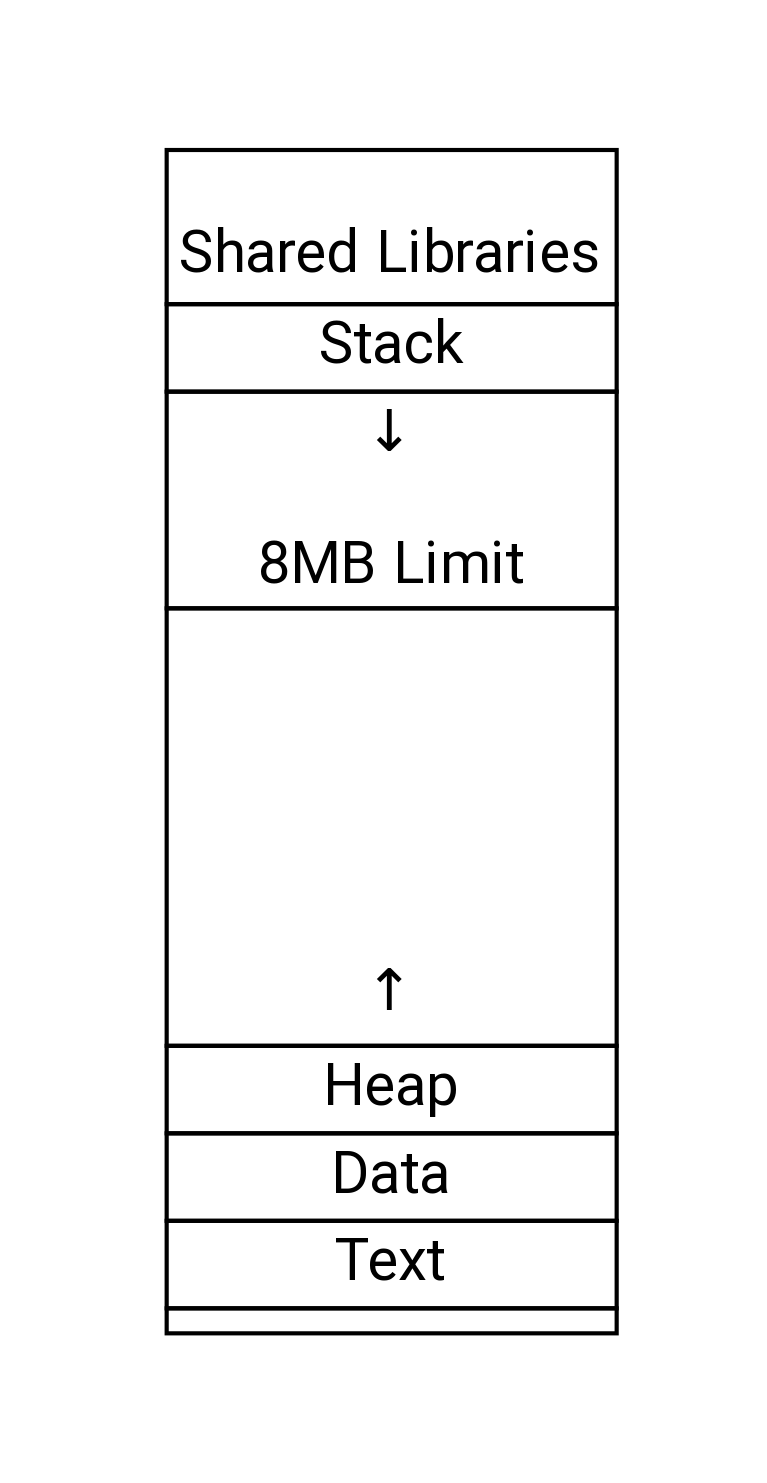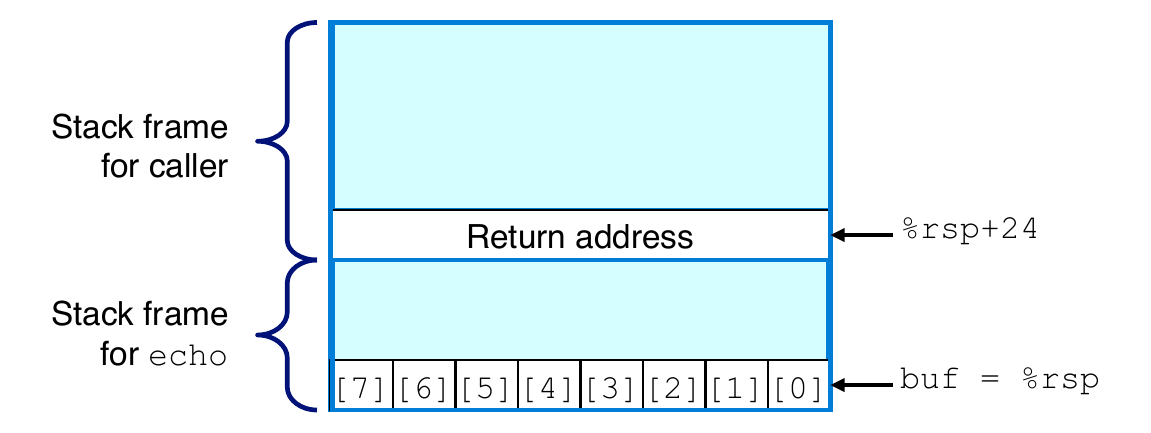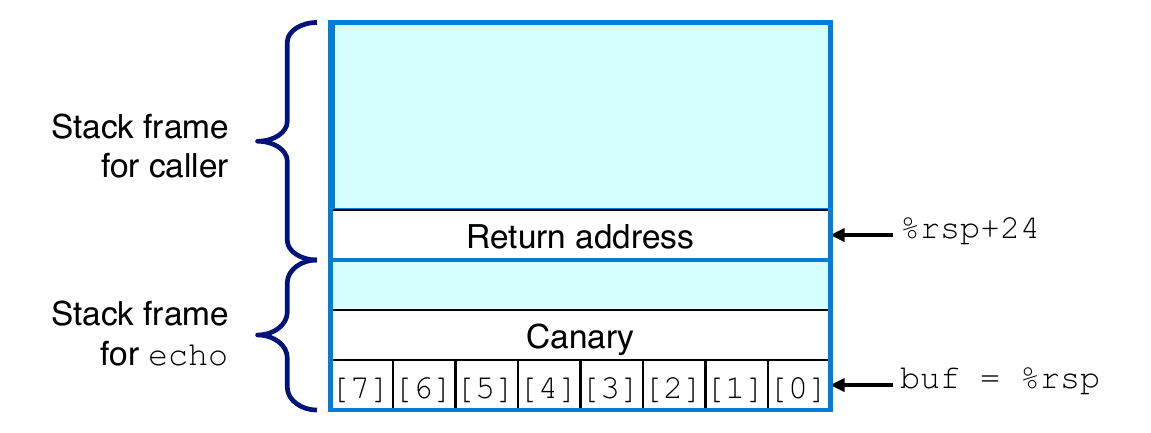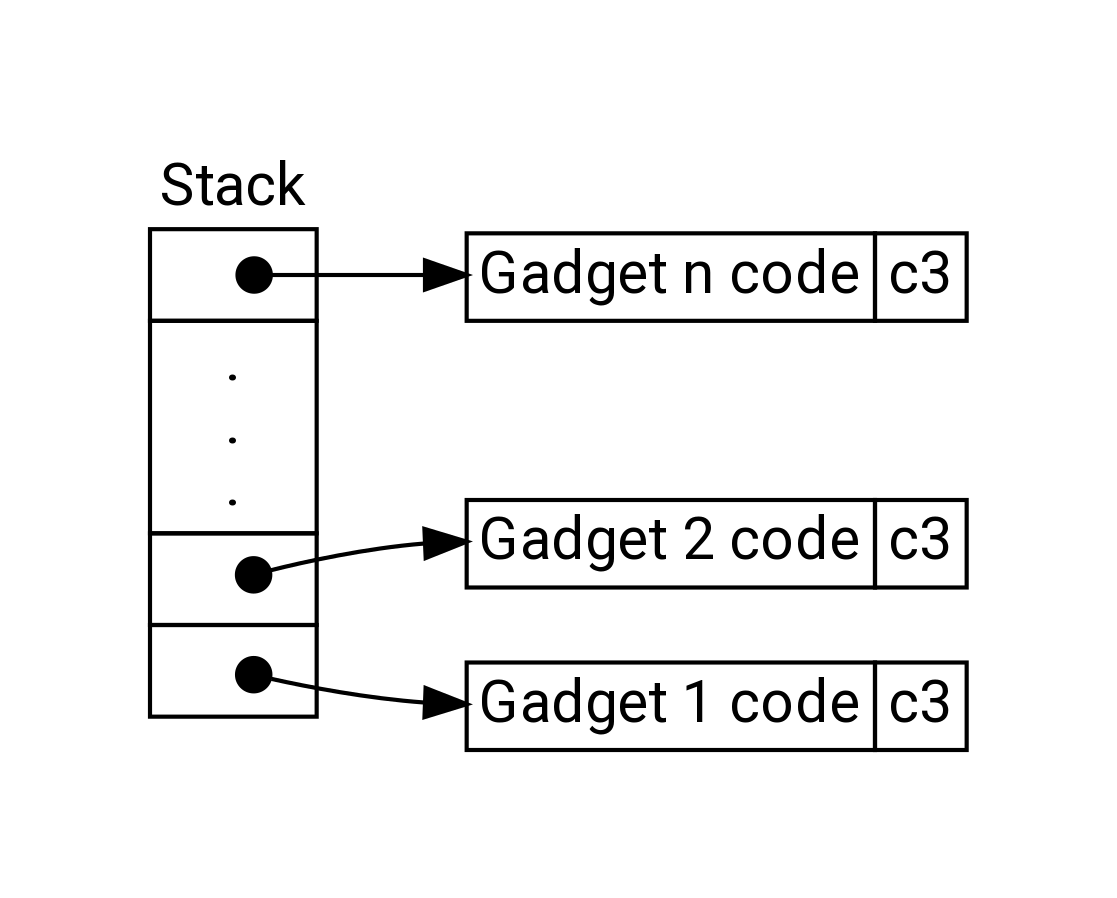Machine Programming Advanced Topics
CSC 235 - Computer Organization
References
- Slides adapted from CMU
Outline
Memory Layout
- Buffer Overflow
- Vulnerability
- Protection
Unions
x86-64 Linux Memory Layout
- Stack
- Runtime stack (8MB limit)
- For example, local variables
- Heap
- Dynamically allocated as needed
malloc,calloc,new
- Data
- Statically allocated data
- For example, global variables,
staticvariables, string constants
- Text / Shared Libraries
- Executable machine instructions
- Read-only
x86-64 Linux Memory Layout

Memory Allocation Example
char big_array[1L<<24]; // 16 MB
char huge_array[1L<<31]; // 2 GB
int global = 0;
int useless() { return 0; }
int main() {
void *phuge1, *psmall2, *phuge3, *psmall4;
int local = 0;
phuge1 = malloc(1L << 28); // 256 MB
psmall2 = malloc(1L << 8); // 256 B
phuge3 = malloc(1L << 32); // 4 GB
psmall4 = malloc(1L << 8); // 256 B
// some print statements
}x86-64 Example Addresses
| Symbol | Example Address | Location |
|---|---|---|
local |
0x00007ffe4d3be87c |
stack |
phuge1 |
0x00007f7262a1e010 |
heap |
phuge3 |
0x00007f7162a1d010 |
heap |
psmall4 |
0x000000008359d120 |
heap |
psmall2 |
0x000000008359d010 |
heap |
big_array |
0x0000000080601060 |
data |
huge_array |
0x0000000000601060 |
data |
main() |
0x000000000040060c |
text |
useless() |
0x0000000000400590 |
text |
- Note: there is a “gap” in the heap memory. More on this later.
Runaway Stack Example
int recurse(int x) {
int a[1<<15]; // 128 KiB
printf("x = %d. a at %p\n", x, a);
a[0] = (1<<14)-1;
a[a[0]] = x-1;
if (a[a[0]] == 0) {
return -1;
}
return recurse(a[a[0]]) - 1;
}- Functions store local data on stack in stack frame.
- Recursive functions cause deep nesting of stack frames.
Memory Referencing Bug Example
typedef struct {
int a[2];
double d;
} struct_t;
double fun(int i) {
volatile struct_t s;
s.d = 3.14;
s.a[i] = 1073741824; // possibly out of bounds
return s.d;
}Memory Referencing Bug Example
Example inputs/outputs
fun(0) -> 3.1400000000fun(1) -> 3.1400000000fun(2) -> 3.1399998665fun(3) -> 2.0000006104fun(6) -> Stack smashing detectedfun(8) -> Segmentation fault
Results are system specific
Such Problems are a BIG deal
- Generally called a “buffer overflow”
- when exceeding the memory size allocated for an array
- Why a big deal?
- It is the number 1 technical cause of security vulnerabilities
- What is the number 1 overall cause?
- social engineering / user ignorance
- Most common form
- Unchecked lengths on string inputs
- Particularly for bounded character arrays on the stack
- sometimes referred to as stack smashing
String Library Code
Implementation of Linux function
gets()char *gets(char *dest) { int c = getchar(); char *p = dest; while (c != EOF && c != '\n') { *p++ = c; c = getchar(); } *p = '\0'; return dest; }- No way to specify limit on number of characters to read
- Similar problems with other library functions
strcpy,strcat: copy strings of arbitrary lengthscanf,fscanf,sscanf: when given%sconversion specifier
Vulnerable Buffer Code
/* Echo Line */
void echo() {
char buf[8]; // way too small
gets(buf);
puts(buf);
}
void call_echo() {
echo();
}Buffer Overflow Disassembly
echo:
subq $24, %rsp # allocate 24 bytes on stack
movq %rsp, %rdi # compute buf as %rsp
call gets # call gets
movq %rsp, %rdi # compute buf as %rsp
call puts # call puts
addq $24, %rsp # deallocate stack space
retBuffer Overflow Stack Example

| Characters typed | Additional Corrupted State |
|---|---|
| 0 - 7 | None |
| 9 - 23 | Unused stack space |
| 24 - 31 | Return address |
| 32+ | Saved state in caller |
Stack Smashing Attacks
- Overwrite the normal return address
Awith address of some other codeS When
Qexecutesret, will jump to other code.void P() { Q(); ... // <- return address A } void Q() { char buf[64]; gets(buf); ... return ...; } void S() { // something unexpected }
Crafting Smashing String
Target C code
void smash() { printf("I've been smashed!\n"); exit(0); }Target Disassembly
00000000004006c8 <smash>: 4006c8: 48 83 ec 08Goal: craft a string that overwrites the return address with the address of the target function.
Performing Stack Smash
Put hex string in file
smash-hex.txt- Use hexify program to convert hex digits to characters
- Some of them are non-printing
Provide as input to a vulnerable program.
Code Injection Attacks
- Input string contains byte representation of executable code
- Overwrite return address
Awith address of bufferB When
Qexecutesret, will jump to exploit codevoid P() { Q(); ... // <- return address A } int Q() { char buf[64]; gets(buf); ... return ...; }
Preventing Buffer Overflow Attacks
- Avoid overflow vulnerabilities
- Employ system-level protections
- Have compiler use “stack canaries”
1. Avoid Overflow Vulnerabilities in Code
void echo() {
char buf[4];
fgets(buf, 4, stdin);
puts(buf);
}- For example, use library routines that limit string lengths
fgetsinstead ofgetsstrncpyinstead ofstrcpy- Do not use
scanfwith%sconversion specifier- Use
fgetsto read the string - or use
%nswherenis a suitable integer
- Use
System-Level Protections Can Help
- Randomize stack offsets
- At start of program, allocate random amount of space on stack
- Shift stack addresses for entire program
- Makes it difficult for a hacker to predict the beginning of inserted code
- Non-executable code segments
- In tradition x86 can mark region of memory as “read-only” or “writable”
- Can execute anything readable
- x86-64 added explicit “execute” permission
- Stack marked as non-executable
- In tradition x86 can mark region of memory as “read-only” or “writable”
Stack Canaries Can Help
- Idea
- Place a special value (“canary”) on stack just beyond buffer
- Check for corruption before exiting function
- GCC Implementation
- Flag
-fstack-protector
- Flag
- Example

Return-Oriented Programming Attacks
- Challenge (for hackers)
- Stack randomization makes it hard to predict buffer location
- Marking stack non-executable makes it hard to insert binary code
- Alternative Strategy
- Use existing code
- For example, library code fro stdlib
- String together fragments to achieve overall desired outcome
- Does not overcome stack canaries
- Use existing code
- Construct program from gadgets
- Sequence of instructions ending in
ret- Encoded by single byte
0xc3
- Encoded by single byte
- Code positions fixed from run to run
- Code is executable
- Sequence of instructions ending in
Gadget Example #1
C example code
long ab_plus_c(long a, long b, long c) { return a*b + c; }Disassembly
0000000000000000 <ab_plus_c>: 0: f3 0f 1e fa endbr64 4: 48 0f af fe imul %rsi,%rdi 8: 48 8d 04 17 lea (%rdi,%rdx,1),%rax c: c3 retq- rax \(\leftarrow\) rdi + rdx
- Gadget address = 0x8
Use tail end of existing functions
Gadget Example #2
C example code
void setval(unsigned *p) { *p = 3347663060u; }Disassembly
000000000000000d <setval>: d: f3 0f 1e fa endbr64 11: c7 07 d4 48 89 c7 movl $0xc78948d4,(%rdi) 17: c3 retq- Bytes
48 89 c7encodesmovq %rax, %rdi% - rdi \(\leftarrow\) rax
- Gadget address = 0x15
- Bytes
Repurpose byte codes
Return-Oriented Programming Execution
- Trigger with
retinstruction- Will start executing Gadget 1
- Final
retin each gadget will start next oneret: pop address from stack and jump to that address

Union Allocation
- Allocate according to largest element
Can only use one field at a time
Union example: 8 bytes total storage
union U1 { char c; // 1 byte int i[2]; // 8 bytes double v; // 8 bytes } *up;- Struct example: 24 bytes total
struct S1 {
char c; // 1 byte + 3 bytes padding
int i[2]; // 8 bytes + 4 bytes padding
double v; // 8 bytes
} *up;Using Union to Access Bit Patterns
typedef union {
float f;
unsigned u;
} bit_float_t;
float bit2float(unsigned u) {
bit_float_t arg;
arg.u = u;
return arg.f;
}
unsigned float2bit(float f) {
bit_float_t arg;
arg.f = f;
return arg.u;
}Byte Ordering Revisited
- Idea
- Short/long/quad words stored in memory as 2/4/8 consecutive bytes
- Which byte is most (least) significant?
- Can cause problems when exchanging binary data between machines
- Big Endian
- Most significant byte has lowest address
- Sparc, Internet
- Little Endian
- Least significant byte has lowest address
- x86, ARM
- Bi Endian
- Can be configured either way
- ARM
Summary of Compound Types in C
- Arrays
- Contiguous allocation of memory
- Aligned to satisfy every element’s alignment requirement
- Pointer to first element
- No bounds checking
- Structures
- Allocate bytes in order declared
- Pad in middle and at end to satisfy alignment
- Unions
- Overlay declarations
- Way to circumvent type system
Summary
- Memory Layout
- Buffer Overflow
- Vulnerability
- Protection
- Code Injection Attack
- Return-Oriented Programming
- Unions